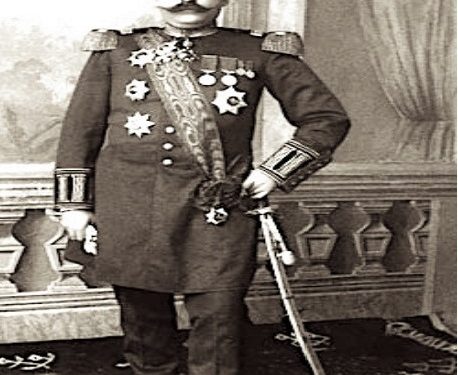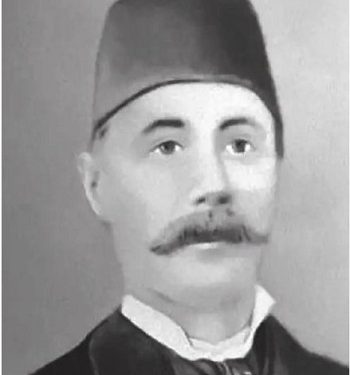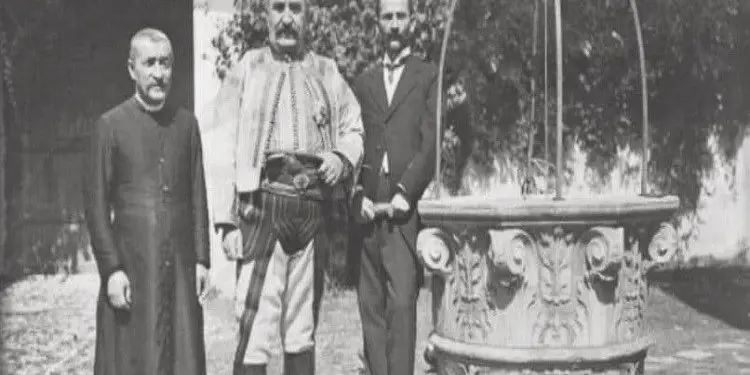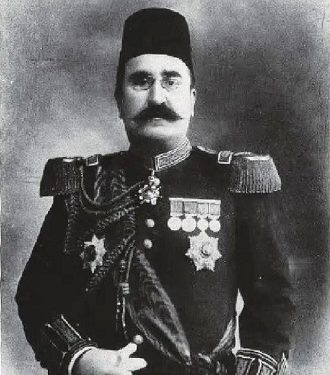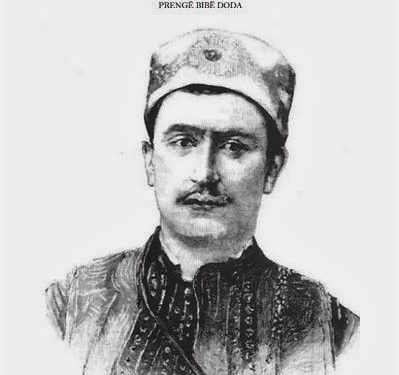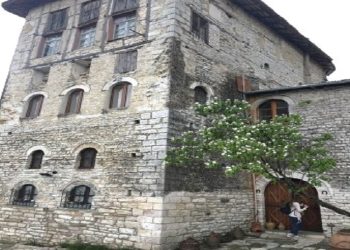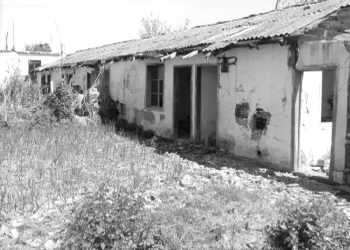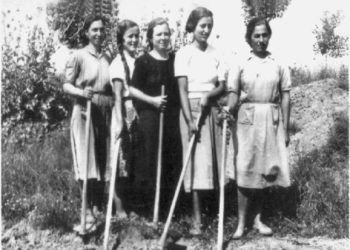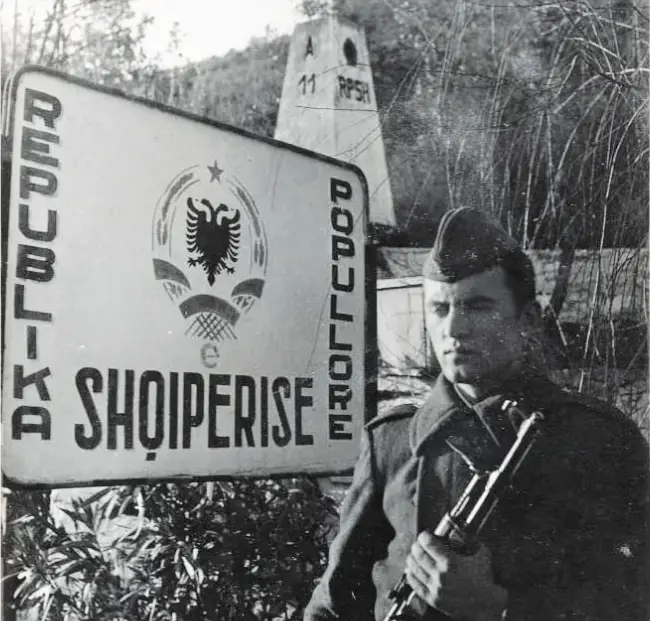By Dr. Nikol Loka
Part thirteen
“PRENGA BIBE DODA, THE SHADOWS OF A CITIZENSHIP”
Memorie.al / The newest book “Prengë Bibë Doda, a phenomenon in Albanian political life”, by researcher Nikollë Loka, not only expands the scope of historical studies on Mirdita, the Door of Gjonmarkaj and the figure of the Mirdita Prince, Prengë Bibë Doda, but it is also a contribution to national historiography. The very rich archival material, the literature used or consulted, oral traditions, etc., make this book a real study treasure, giving the science of history a scientific monograph that enriches our knowledge of Mirdita, its captains, tradition, history etc. To study such an important and complex figure, as the figure of Prengë Biba Doda, is a high scientific responsibility that not everyone undertakes. Nikollë Loka, has done a great job of research and treatment by the professional researcher, giving us the portrait of the Prince and the general Mirditor, with the true contours. Dr. Loka has adhered to the end of the space and time, in which the multidimensional events and their protagonists have developed.
THE MONOGRAPH “ABOUT BIBË DODA, A PHENOMENON IN ALBANIAN POLITICAL LIFE”, A VALUABLE SCIENTIFIC STUDY THAT ENRICHS THE FUND OF OUR HISTORICAL STUDIES
(By Mr. Sc. Murat Ajvazi, March 2017, Switzerland)
Continues from last issue
Neither war nor peace
The situation in Mirdita was neither war nor peace. The Ottoman authorities were carefully watching the situation and had decided to launch a general attack on the Province at the most opportune moment. For his part, Prenga was obliged to organize the fighting forces and prepare for war. For this purpose, he bought in Mat 10 thousand dozens of cartridges produced by the country’s population. In addition, he sent a very close letter to Prince Nicholas. (240)
Instead of coming to an agreement, Dervish Pasha did his best to confuse matters, in the first week of February, Marka Gjon Ndoca of Kashnjeti, who was being followed by the local government, as a suspect of connection with Montenegro, is being investigated at Shkoder. To escape arrest, he enters the house of Biba Doda, who enjoyed the protection of France from the beginning. Turkish forces surround the house and try to arrest him. He responds with a gun. About 50 armed mirditas, who happened to be in Shkodër for their troubles, go to his aid. The situation became so complicated that it required the intervention of foreign consuls. The Turkish forces, even against the promises of the Governor of Shkodra, arrested Marka Gjon Ndoca, as soon as he left the house of Kapidan Bibë Doda. (241)
Prenga retaliated, taking prisoner the Bajraktar of the Muslim tribe of Dibra and cut off the road between Prizren and Shkodër. The Turks then closed the gorges of Mirdita and concentrated on the fortress of Puka. Although the Turks released or let their hostage escape, Prengë Bibë Doda did not release his own. (242) The Ottoman authorities did not stand idly by. They tightened their measures within days. First, they closed the markets of Shkodra, Lezha, Prizren and Gjakova for the Mirditas and stopped their passage through the rafts of the rivers Drin and Mat; then they distributed large sums of money to their supporters in Mirdita and other provinces around it and gathered numerous armies against Mirdita.
In response, the insurgents surrounded the Turkish garrison of Puka, captured the kaymekam of that region, Zenel Aga of Tivar, and the commander of the garrison, Bimbashin Mustafa Aga of Kryeziu, who took them to Orosh, where the headquarters of the uprising was. Then, in the morning, the insurgents went to Qafë i Mali, cutting off the road that connected Shkodra to Prizren and settled in Mali e Krestë. On February 18, 1877, 600 men from the Bajraks of Zhupa gathered in the church of Rubik, where they decided not to allow the Turkish forces of Lezha to pass through their province to attack the insurgents. (243)
But the possibilities for agreement still existed. With the advice of foreign diplomats, especially the French consul in Shkodër, Prenga softened his stance and was ready for a compromise solution. On March 12, 1877, he released Zenel Aga of Tivari and Mustafa Aga of Kryeziu. (244)
In the same way, Dodë Gega came out of the siege in a strange way and after a few days, the siege of his house was lifted, leaving his relatives and supporters free. On the other hand, the road to Prizren was left free and the garrison of Puka was supplied with food. (245)
Signals for compromise were also given directly by 70 leaders, chieftains and elders of Mirdita, gathered in Orosh, who addressed Dervish Pasha, commander of the Shkodra Division, where they informed him of the concessions they had made and demanded the condition of only: recognition of Prengë Bibi Doda, as their first. International diplomacy also came into play. But the English and Italian consuls failed in the mission for the peaceful resolution of the conflict. It seems that the decision to attack Mirdita was made and its execution was only a matter of days. (246)
The measures taken by Prengë Bibë Doda, to appease the Turkish authorities of Shkodra, did not give the results expected from him. (247)
The unequal war with the Turks and the general attack of the Turkish armies commanded by Aqif Pasha, Riza Bey, Abdi Pasha and Osman Bey against the insurgents, began on April 8 from Shkodra, Lezha, Prizren and Mati. The participation of 12,000 soldiers was intended to quickly extinguish the uprising, without starting the war with Montenegro, to teach a good lesson to this province, which had long been the instigator of the war of other provinces against the Ottoman Empire. . The attack from Naraçi on April 8, 1877, was lightning fast and with the combination of all weapons. The insurgents, although few in number, with old weapons and insufficient ammunition, resisted the first day, but the attacks of April 10 and 11 could not withstand them and retreated, leaving several dead and wounded.
On April 11, the Turks also attacked from Lezha in the direction of the Molung mountain. In Manati, the first clash took place between the Turkish forces and the insurgents of the Lezha Highlands, who had made an alliance to prevent the Turks from entering Mirdita from their country. However, the Turkish forces were able to penetrate through Vela, Bulgër, Kryezez to Livadhez. In the same way, other forces started from Naraçi, occupied Mnela and came out on Kashnje. The insurgents withdrawn from the front lines, as well-versed in the terrain, with surprise attacks, especially at night, when the Turks did not expect them, brought significant losses. But even these losses did not prevent the Turks from continuing the attack. On the other front, the Turkish forces that started from Prizren, under the command of Osman Bey, after occupying Qafa e Mali, occupied Fani on April 13 and reached the border with Orosh, on the morning of April 21, 1877. On the same day, the Turkish forces of 4 battalions, launched from Mati, under the command of Avdi Pasha attacked from Kthella.
Oroshi, the headquarters of the uprising, surrounded on all four sides, fell into the hands of the invaders. The headquarters of the uprising, along with the villagers, left their homes and took refuge in caves and forests. Oroshi was destroyed by the Turks, many houses were looted and burned, among them the Gjonmarkaj saraj. Expressing his regret for the development of events on the ground, the Consul of France in Shkodër informed his superiors in Paris: “It is certain that the Porta will request the departure of the new Head in the morning. Prenga, today I am reaping the fruits of a thoughtless, presumptuous and premature behavior, the consequences of which I had not stopped warning”. (248)
For his part, Prengë Bibë Doda, had announced on April 14 the consuls of France and Austria-Hungary: “Seeing that a further resistance would not bring any benefit to this people and would not bring unnecessary bloodshed, I, my family and my supporters, are putting ourselves under the powerful protection of two high governments, the French Republic and Austria-Hungary, begging them to exert their influence for the conquest of the fighting, against Mirdita”. (249)
After leaving Oroshi, Prenga with his mother, sister, together with his cousins, took refuge in Lura. (250)
In the mountains of Oroshi
The beginning of the war with Montenegro completely changed the situation in Mirdita. The main Turkish forces were forced to withdraw and go to the Montenegrin front. In this new situation, Prince Bibëdoda thought that the right moment had come to get the Turks out of Mirdita. In a letter to one of his supporters in Shkodër, he wrote, among other things: “From my previous announcements, you must have understood the imperative need to send us gunpowder. The stance we have taken so far has not been limited except by the lack of ammunition. The attitude of Kapidan Kola, the son of Prenga Kola and Dom Prendi, was excellent, but the large Turkish forces and the lack of gunpowder forced them to give ground. … If within these six or seven days, the weapons and ammunition promised by the Prince arrive, you will hear talk about Mirdita, differently than you expect”. (251)
Contrary to what was expected, Montenegro no longer needed the Mirditas, as their great ally, Russia, had put the Turkish forces in front of them. Montenegro had always been an adversary of the Albanians and suddenly, the opportunity to create Albanian-Turkish enmity is seen use it to his advantage…
It is certain that the Montenegrin government sees with pleasure and supports the unrest in Northern Albania. Montenegro instigates the war so that the Albanians can be exterminated by Turkey and thus Montenegro has an open way to the south. (252)
On January 20, 1878, the insurgent leaders organized a meeting in Bjeshket e Oroshi, in which they made the decision; “to attack the Turkish garrisons of Oroshi and Kashnjet”. On January 25 of that year, about 3,000 insurgents suddenly and simultaneously attacked the garrison of Oroshi, which had only 300 Turkish soldiers, and the garrison of Kashjet, where a well-armed battalion was stationed, with artillery. The Turkish garrisons, taken by surprise by the lightning attack of the insurgents, were routed and pursued to Narac, on the border with Shkodra, where the numerous Turkish forces were concentrated.
In these circumstances, the Vali of Shkodra, Ali Saib Pasha, set out against the insurgents Ibrahim Beun, with many raids and ordered the generals of Dibra and Mati to march with their armies to Mirdita. Turkish forces launched from Shkodra, under the command of Ibrahim Bey, began the attack on January 30, 1878, in the direction of Naraç, but the insurgents, who had occupied key positions on that front in time, suffered significant losses. Before this resistance, the Turks retreated temporarily. But on January 31 of that year, after being reinforced with fresh units and artillery, they launched a furious offensive, and the insurgents, despite their heroic resistance, could not stand against the units of the Rediffs, who were supported by artillery.
The signing of the terms of peace between the Russians and the Turks on the same day enabled the Turkish command of Shkodra to organize the punitive operation against the Mirdita movement. The governor of Shkodra and the headquarters of the Turkish armies of the Vilayet decided to drown the rebellion of Mirdita in blood, to liquidate its privileges once and for all and to establish their administration here, with kaymekam and Ottoman officials. In order to realize these plans, the Turkish armies were unleashed on the Mirdis with all their means of extermination.
The second operation against Mirdita, started from Shkodra and Lezha. Meanwhile, in Dibër and Mat, other armies were being prepared that would march there. During the march to Orosh, the Turks burned 70 houses, only in Mnelë and Vig, arrested 75 mirditas, most of them old men and sent them to Shkodër, bound in handcuffs. The entire province was subjected to unprecedented reprisals. In Orosh, the Turks burned the entire village and massacred many old men, who had not been able to climb the mountains, like other family members.
Even after the conquest of Oroshi, the Mirditas demanded the coordination of military actions with Montenegro. Abbot Prend Doçi and Captain Gjon Doda, left for Cetina, to talk about this issue, but were caught at the border and sent to Istanbul. (253)
A telegram from the High Gate had tasked Valiu to appoint Dodë Gega “Mydir” of Mirdita. He refused the offered post, noting the immovable loyalty of the mirditors to the cause of Prenga Pasha. This, again, is a big mistake and proves the necessity to clarify the relations of Kapidan Prenga and Mirdita with the Porta, and this in their own interest and that of the Catholics of the province, so that the autonomy of this mountainous province can be guaranteed. (254)
The importance of the Mirdita uprising
The Mirdita Uprising of 1866-1877, which was the most powerful movement on the eve of the Albanian League of Prizren. It had as its minimum program, the preservation of traditional self-government, recognizing the son of Biba Doda, as the legitimate head of the Province, while as its maximum program, the declaration of the Principality of Mirdita, as an autonomous state ethnic group, under the suzerainty of the Sultan or any other foreign power.
The movement was influenced by the Shkodra intellectual circles, who had not given up the idea of creating the core of the future Albanian state, which they saw in Mirdita, following the example of Piedmont in Italy. But the province of Mirdita could not become the Albanian “Piedmont”, as many internal and external factors did not favor that province to take a central role for developments in the country.
The opposition of the High Gate, to make a compromise with the Mirditas, was a bad signal for the Albanians and showed that the Ottoman Empire, even at the height of its decline, had no intention of allowing the creation of the Albanian national identity. The Albanians were not able to start the nation-forming process at that time, so that they themselves would have to face the neighboring countries, which sought to benefit from the Albanian lands. Turkish policy after the Congress of Berlin. showed that the attitude towards Mirdita was not an isolated case, because the Ottoman authorities later took the same attitude towards the Albanian Muslim population.
The Albanians became aware of the need for national unity late and rose to the struggle for independence, only when the national existence was threatened by the armies of the neighboring Balkan states. On the other hand, France and Austria, who had the protectorate over the Catholic population, did not help the movement and did their best to continue the status quo in Mirdita. For its own reasons, Austria requested that the uprising not begin. (255)
While France, starting from the benevolent attitude towards the Province and Prenga itself, had milder opposition, but they advised the Prince, that; “the appropriate moment had not come for the Mirditas with their weapons to impose themselves on the High Gate”. Despite the fact that the French were in favor of keeping calm, at least until the right conditions were created, they gave Mirdita moral support. (256)
The French government put pressure on Istanbul to forgive the insurgents and move towards reconciliation. The fact that the Albanians were not prepared to separate from Turkey does not diminish the value of the Mirdita uprising, which took place in the period of the anti-Turkish movements of other Christian populations of the Balkans and aimed at the same time as them autonomy, or complete independence, from the High Gate. The events that followed gave a message to the Albanians that only united and with the strength of their weapons; they can protect the country from the chauvinist greed of the neighbors, because Turkey was ready to hand over those territories to the neighboring chauvinist states.
This uprising has been labeled by some individuals as; separatist movement. It is not right to call the effort for liberation, even of a part of the country, as separatism. Many nation-states were formed piecemeal and separate territories joined the national trunk later. The coordination of subsequent anti-Turkish uprisings with other provinces of the country shows that Mirdita was not interested in fighting only for herself and was willing to cooperate with all other provinces for the creation of Albania independent. Memorie.al
The next issue follows
- Column Çekald, Consul of France in Shkodra-Dukës Dekaz, Minister of Foreign Affairs in Paris, letter No. 146, Shkodra January 23, 1877, Ligor Mile, Albanian League of Prizren in French documents, vol. I-II, Tirana: 1978-1979
- Luigj Martini, Prince without a throne of Mirdita,… p.28
- La Guerre d’Orient in Europe e in Asia, No. 4 p. 35, taken from “Leka”, monthly cultural magazine, No.VII-XII, year 1939, special issue League of Prizren, press “Zonja e Papërlyeme”, p.202
- Luigj Martini, Prince without a throne of Mirdita,… p.29
- The leaders of Mirdita Dervish Pasha, Commander of the Shkodra Division, On the cessation of the actions of the insurgents of Mirdita, Albania in the years of the Albanian League of Prizren, volume I
- Column Çekald, Consul of France in Shkodër-Dukes Dekaz, Minister of Foreign Affairs in Paris, Shkodër April 10, 1877, Ligor Mile, Albanian League of Prizren in French documents, vol. I-II, Tirana: 1978-1979
- Kolona Çekald, Consul of France in Shkodër-Dukës Dekaz, Minister of Foreign Affairs in Paris, Shkodër, April 9, 1877, Albania in the years of the Albanian League of Prizren, volume I
- Kolona Çekald, Consul of France in Shkodër-Dukës Dekaz, Minister of Foreign Affairs in Paris, Shkodër, April 9, 1877, Albania in the years of the Albanian League of Prizren, volume I
- Kolona Çekald, Consul of France in Shkodër-Dukës Dekaz, Minister of Foreign Affairs in Paris, Shkodër, April 16, 1877, Ligor Mile, Albanian League of Prizren in French documents, vol. I-II, Tirana: 1978-1979
- Prengë Bibë Doda, Letter to the Consuls of France and Austria-Hungary, Orosh April 14, 1877, Albania in the years of the Albanian League of Prizren, volume I
- Zef Marka Harapi, Mirdita in history and gojdhana until 1929, No.6, year 1931, p.360
- Letter to Bibë Doda, a supporter of his in Shkodër, Albania during the years of the Albanian League of Prizren, volume I
- Franc Nopça, Travels in the Balkans,… p.303
- Kolona Çekald, Consul of France in Shkodër-Dukes Dekaz, Minister of Foreign Affairs in Paris, Shkodër, May 7, 1877, Albania in the years of the Albanian League of Prizren, volume I
- HHStA-PA-Vj.30-75, Report of the Austro-Hungarian Consul in Shkodër Lippih to the Austro-Hungarian Ambassador in Istanbul, with which information is given on the development of the conflict with Montenegro, see the Albanian League of Prizren in Austro-Hungarian documents, Volume I, “Albanica” publications, Tirana-Pristina 2008, p.175-176
- Letter from Prengë Bibë Doda to Kolona Çekaldi, Consul of France in Shkodër, Orosh February 28, 1877, Albania in the years of the Albanian League of Prizren, volume I
- Thabie, Interests d’imperialism français, Paris 1997




